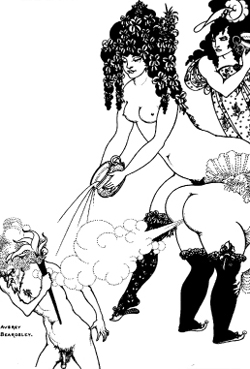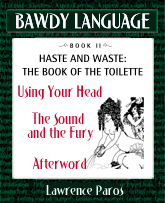Bawdy Language: Book Excerpts
As a public service, to advance the world's awareness and understanding of the origins of curse words, swear words, dirty talk, and sexual slang, and to whet your appetite for more, we offer for your pleasure a page from each chapter. These samplers provide a good sense of the subject matter of each chapter, each of which is self contained. They are cool both for reading and as a gift. Individual chapters can be downloaded at a mere $1.99 each. Such a bargain!
The Sound and The Fury: Book II - Haste Makes Waste/ The Toilette 2
The Erotic Tongue
Haste Makes Waste: The Book of the TOILETTE

With garlic and claret and bacon and greens
Your bowels get so busy distilling a gas
That Nature insists you permit it to pass.
You are very polite, and you try to exhale
Without noise or order-you frequently fail-
Expecting a zephyr, you carefully start
But even a deaf one would call it a fart!
— "Ode to Those Four-Letter Words"


Then he must die, who often farts;
And if to die be to lose one's breath
Then death's a fart; and so a fart is death.
There are those who consider it one of the most offensive and repugnant words in the English language. Some think it may even give the Big F a run for its money. Closer study, however, reveals that the fear of the fart is blown far out of proportion. Admittedly not the most genteel of words, it does have a playful dimension. Though hard to imagine, it also has legitimate roots. They can be found in the old Sanskrit word pardate, "he breaks the wind."
Down and Dirty
There is also a clear line from the Old English feortan to the Middle English farten to today's fart. The fart's been around for quite a while. According to the OED, its first documented use occurred around 1250. Chaucer used it in 1386 in The Summoner's Tale and in his Miller's Tale, where he wrote, "He was somdel squaymous of farting." He then relates an incident in which Nicholas plays a cruel joke on poor Absolon by farting in his face. Not particularly pleased by the act, Absolon retaliates, applying a hot poker to Nicholas' ass.
Since Chaucer's time, the word has been a favorite of many English satirists. Ben Jonson and others used it freely. Samuel Johnson's dictionary of 1751 included it, citing a quotation from Jonathan Swift to illustrate its use: "So from my Lord his passion broke. He farted first and then he spoke."
Gone With the Wind
The fart's fine lineage not withstanding, other reference works have been more standoffish. The esteemed Oxford English Dictionary unequivocally declared fart "not fit for proper use." Nobody knows why the OED chose to close down this innocuous form of personal expression or how the decision was made. One can only imagine a group of eminent scholars gathered in their ivory tower, deliberating upon the fate of words, having a beer or two, and shooting the breeze.
241

